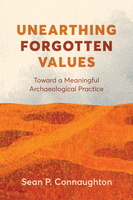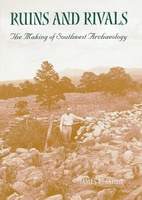Lookout Cave
The Archaeology of Perishable Remains on the Northern Plains
This fully illustrated volume sheds new light on Plains culture and the centuries old use of the well-hidden space at Lookout Cave.
Unearthing Forgotten Values
Toward a Meaningful Archaeological Practice
Unearthing Forgotten Values offers a practical corrective that restores human values to commercial archaeology by putting Indigenous communities first.
Signs of the Time
Nłeʔkepmx Resistance through Rock Art
Drawing on a unique blend of Indigenous and Western sources, Signs of the Time explores Nłeʔkepmx rock art making to reveal the historical and cultural meaning beneath its beguiling imagery.
We Are Coming Home
Repatriation and the Restoration of Blackfoot Cultural Confidence
The story of the highly complex process of of sacred objects to Aboriginal peoples from the Glenbow Museum.
People of the Middle Fraser Canyon
An Archaeological History
The first synthesis of the archaeological and ethnological evidence pertaining to the St’át’imc or Upper Lillooet people of the Mid-Fraser Canyon.
Euphoria & Dystopia
The Banff New Media Institute Dialogues
Light from Ancient Campfires
Archaeological Evidence for Native Lifeways on the Northern Plains
Light from Ancient Campfires is the first book in twenty years to gather together a comprehensive prehistoric archaeological record of the Alberta Plains First Nations.
Toward a Behavioral Ecology of Lithic Technology
Modern humans and their hominid ancestors relied on chipped-stone technology for well over two million years and colonized more than 99 percent of the Earth's habitable landmass in doing so. Yet there currently exist only a handful of informal models derived from ethnographic observation, experiments, engineering, and "common sense" to ...
Imagining Head-Smashed-In
Aboriginal Buffalo Hunting on the Northern Plains
Archaeologist Jack Brink has written a major study of the mass buffalo hunts and the culture they supported before and after European contact. drawing on his 25 years excavating at Head-Smashed-In Buffalo Jump in southwestern Alberta, Canada – a UNESCO World Heritage Site.
Animasâ¿¿La Plata Project, Volume II
This report compiles evidence concerning cultural affiliation with NAGPRA items recovered from the Animas-La Plata (ALP) project area near Durango, Colorado, for 25 modern tribal groups residing in Arizona, Utah, Colorado, and New Mexico. Though a small percentage of the cultural resources in the ALP project area represent earlier ...
Gandharan Buddhism
Archaeology, Art, and Texts
The essays in this volume reassess Gandharan Buddhism in light of these findings, utilizing a multidisciplinary approach that illuminates the complex historical and cultural dynamics of the region.
Journey to the Ice Age
Discovering an Ancient World
A captivating record of archaeological discoveries of the Early Paleo-Indians, who exploded suddenly on the archaeological record about 11,500 years ago and expanded rapidly throughout North America and South America.
Haida Gwaii
Human History and Environment from the Time of Loon to the Time of the Iron People
This book brings together the results of extensive and varied field research by both federal agencies and independent researchers, and carefully integrates them with earlier archaeological, ethnohistorical, and paleoenvironmental work in the region.
Hopi Oral Tradition and the Archaeology of Identity
As contemporary Native Americans assert the legacy of their ancestors, there is increasing debate among archaeologists over the methods and theories used to reconstruct prehistoric identity and the movement of social groups. This is especially problematic with respect to the emergence of southwestern tribes, which involved shifting ...
Changing River
This book is a response to the USGS's call for a research design that could be used as a framework for prioritizing cultural resources in the Colorado River ecosystem below Glen Canyon Dam.
Changing River includes summaries of current environmental conditions and previous research and brings together diverse ...
Emerging from the Mist
Studies in Northwest Coast Culture History
This book brings together the most recent research on the culture history and archaeology of a region of longstanding anthropological importance, whose complex societies represent the most prominent examples of hunters and gatherers.
Prehistoric Culture Change on the Colorado Plateau
One of the largest archaeological projects ever undertaken in North America, Peabody Coal Company's Black Mesa Archaeological Project conducted investigations in northeastern Arizona from 1967 to 1983. This mammoth undertaking recognized and recovered the remains of ephemeral camps, early agricultural sites, Puebloan villages, and ...
Ruins and Rivals
Published in cooperation with the
William P. Clements Center for Southwest Studies, Southern Methodist University
Ruins are as central to the image of the American Southwest as are its mountains and deserts, and antiquity is a key element of modern southwestern heritage. Yet prior to the mid-nineteenth century this rich legacy was largely unknown to the outside world. While military expeditions first brought word of enigmatic relics to the eastern United States, the new intellectual frontier was seized by archaeologists, who used the results of their southwestern explorations to build a foundation for the scientific study of the American past.
In Ruins and Rivals, James Snead helps us understand the historical development of archaeology in the Southwest from the 1890s to the 1920s and its relationship with the popular conception of the region. He examines two major research traditions: expeditions dispatched from the major eastern museums and those supported by archaeological societies based in the Southwest itself. By comparing the projects of New York's American Museum of Natural History with those of the Southwest Museum in Los Angeles and the Santa Fe-based School of American Archaeology, he illustrates the way that competition for status and prestige shaped the way that archaeological remains were explored and interpreted. The decades-long competition between institutions and their advocates ultimately created an agenda for Southwest archaeology that has survived into modern times.
Snead takes us back to the days when the field was populated by relic hunters and eastern "museum men" who formed uneasy alliances among themselves and with western boosters who used archaeology to advance their own causes. Richard Wetherill, Frederic Ward Putnam, Charles Lummis, and other colorful characters all promoted their own archaeological endeavors before an audience that included wealthy patrons, museum administrators, and other cultural figures. The resulting competition between scholarly and public interests shifted among museum halls, legislative chambers, and the drawing rooms of Victorian America but always returned to the enigmatic ruins of Chaco Canyon, Bandelier, and Mesa Verde.
Ruins and Rivals contains a wealth of anecdotal material that conveys the flavor of digs and discoveries, scholars and scoundrels, tracing the origins of everything from national monuments to "Santa Fe Style." It rekindles the excitement of discovery, illustrating the role that archaeology played in creating the southwestern "past" and how that image of antiquity continues to exert its influence today.
Prehistoric Painted Pottery of Southeastern Arizona
This volume is a guide to the painted ceramics of southeastern Arizona, one of the most interesting, culturally diverse, and relatively unknown regions of the American Southwest a crossroads and meeting ground for many different prehistoric peoples. The volume was commissioned by the U.S. Army Garrison, Fort Huachuca, for a class on ...
Since the Time of the Transformers
The Ancient Heritage of the Nuu-chah-nulth, Ditidaht, and Makah
This book examines over 4000 years of culture history of the related Nuu-chah-nulth, Ditidaht, and Makah peoples on western Vancouver Island and the Olympic Peninsula.
Huron-Wendat
The Heritage of the Circle
In this book, Georges Sioui, who is himself Wendat, redeems the original name of his people and tells their centuries-old history by describing their social ideas and philosophy and the relevance of both to contemporary life.
Excavations in the Santa Cruz River Floodplain
Excavations in the Santa Cruz floodplain in 1995 provided important new data concerning the Middle Archaic period in southern Arizona. The work reported here represents the first intensive investigation of a stratified Middle Archaic site in the Tucson Basin. Eleven radiocarbon dates place the occupation between approximately 2600 and 1900 ...
Hidden Dimensions
The Cultural Significance of Wetland Archaeology
Scholars from around the globe examine several aspects of wetland archaeology in North America, Mexico, Europe, eastern Siberia, and New Zealand.
Life in Stone
A Natural History of British Columbia's Fossils
Richly illustrated with photographs and drawings, this is the first book to focus on British Columbia's fossils.
Early Human Occupation in British Columbia
A vital contribution to current knowledge about the prehistory in British Columbia, 10,500 to 5,000 years ago.
Early Stages in the Evolution of Mesopotamian Civilization
Between 1969 and 1980, Soviet archaeologists conducted excavations of Mesopotamian villages occupied from pre-agricultural times through the beginnings of early civilization. This volume brings together translations of Russian articles along with new work.
A Complex Culture of the British Columbia Plateau
Traditional Stl'atl'imx Resource Use
This volume considers two British Columbia Native communities – the Lillooet and Shuswap communities of Fountain and Pavilion – and traces their development into complex societies.
Chiefs of the Sea and Sky
Haida Heritage Sites of the Queen Charlotte Islands
Presents an overview of extensive research carried out by archeologist George MacDonald in the 1960s and 1970s to document the history of the Haida villages of the Queen Charlotte Islands.



























